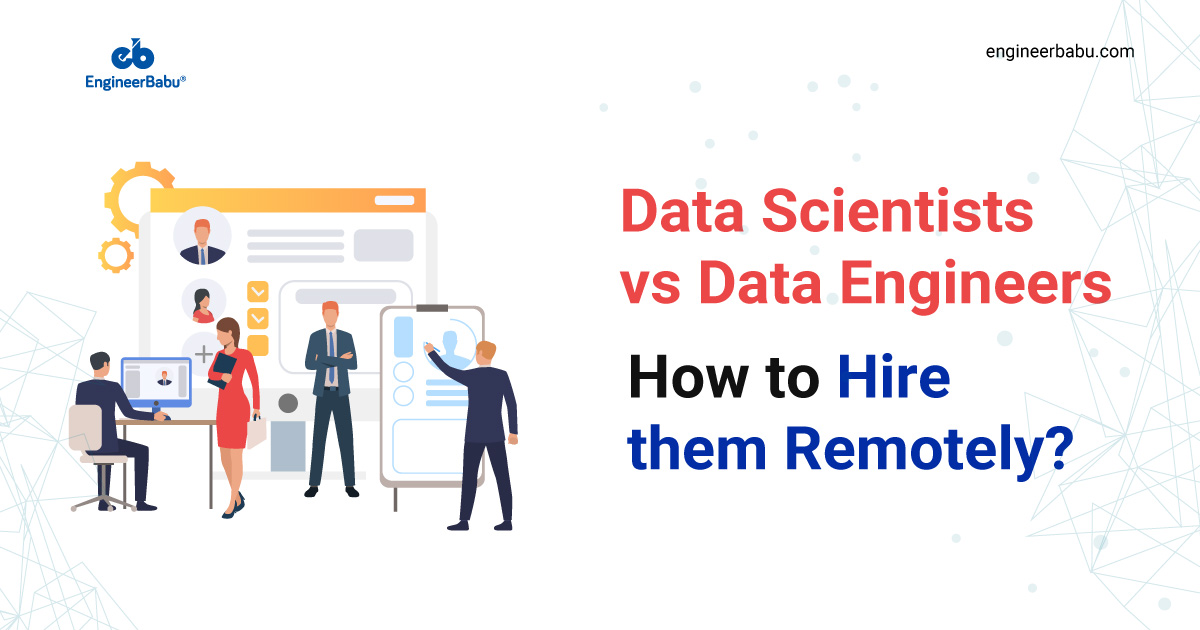Are you a data science enthusiast? Do you want to make a career as a Data Scientist? Do you want to create a better data management system for your business? If you answered yes to any one of these questions, then this blog is for you!
On this day, it’s impossible to imagine a life without data. Data science, the study of information from the enormous amount of data present is one of the most sought-after careers of the time. We’re living in a digital era where every organization is digitizing their data. A major part of Data Scientists’, Data Engineers’ and Data Analysts’ diurnal work includes dealing with zettabytes and yottabytes of structured and unstructured data.
Previously, data scientists were expected to perform the basic tasks of data engineers that included cleaning, creating data pipelines and optimizing data from various sources. However, separating the jobs with the skills and experience have helped businesses in a major way. There are a lot of overlapping skills of both the data scientists and data engineers possess but to achieve maximum efficiency, a business must hire different people for performing the jobs. If you have undertaken a detailed data science course, you will understand the difference.
From analytical, mathematical to programming knowledge, both job profiles may appear similar to employers and they often expect a data scientist to perform what the data engineer can effectively do and vice-versa. This may result in a reduced amount of efficiency and effectiveness of data science projects hence affecting the business in a major way.
In this blog, we list down the major differences between a Data Scientist & a Data Engineer. But first, let’s make you understand the basic need hierarchy of a data process.
The process starts with a company creating a product/service. For the product to be successful, the company needs to perform a market analysis, understanding the needs and demands of customers, the competitors’ analysis and much more to meet market expectations.
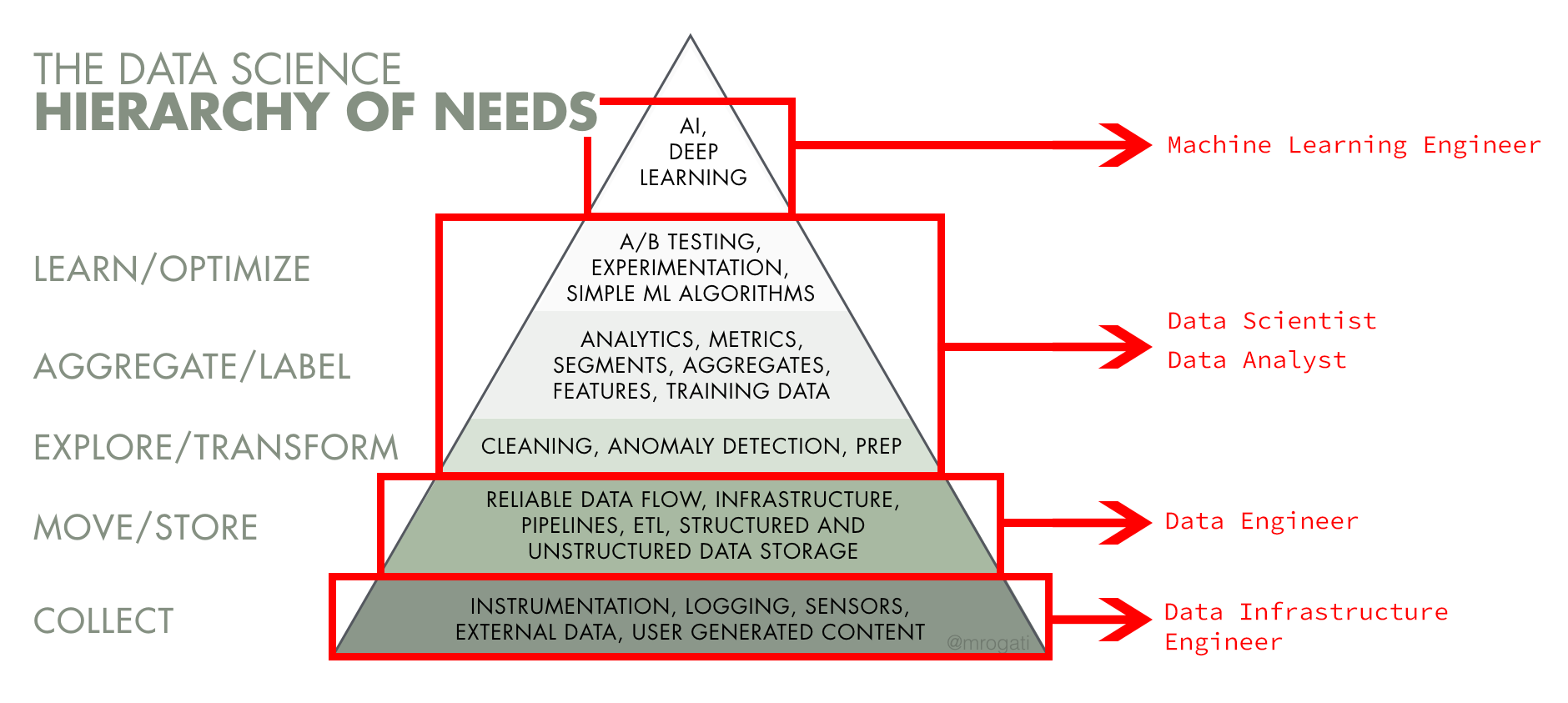
The data is collected from various sources by a data infrastructure engineer and later a reliable data flow along with a usable data pipeline is created by a data engineer. The pipelines are then passed forward to the data scientists who use various data science algorithms, analytical techniques, few testing methods like A/B testing to derive findings that can be used for better market performance.
Data Engineer and Data Scientist are the most in-demand jobs where currently the demand exceeds the supply. Although both professionals essentially have the same goal that is to help businesses optimize how they use data, they differ in how they use the specific skills they possess. To give you a brief understanding, data engineer’s job leans more towards programming to build scalable data products while a data scientist’s job is to focus more on the statistical analysis to gain insights and bring value to a business.
Let’s have a look at the specific differences of both the job profiles:-
What does a Data Engineer do?
Data Engineers deal with the basic infrastructure of data for analysis – including designing, building and optimizing data from a large number of internal and external sources. Usually, the sources include raw sets of data that contain human, machine or instrument errors. The Data Engineers create API’s and frameworks for consuming the data from given sources.
Sometimes, the data will be unformatted or system-specific for which the data engineer will need to recommend ways to improve the quality, efficiency, and reliability of data. The engineers are responsible for the performance of the entire data pipeline for which they build scalable and high-performance infrastructure. Data engineering is creating a data pipeline that is basically a production-ready set of data that encompasses the journey and processes of data in any organization.
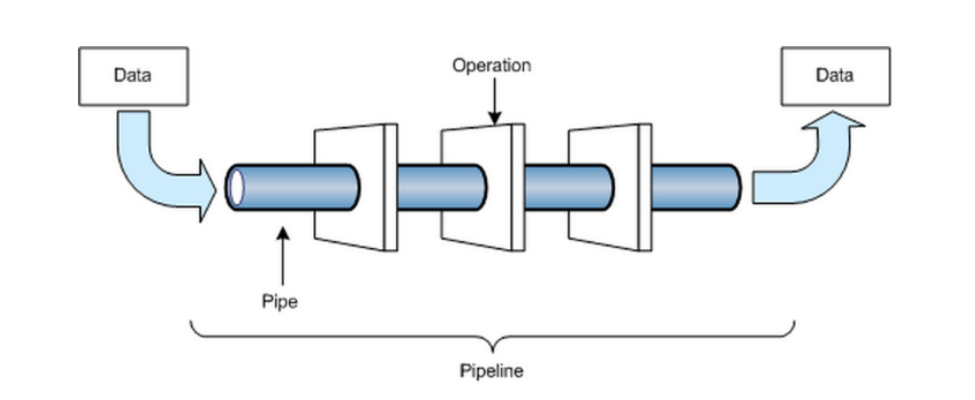
When data engineers create data pipelines, they need to keep in mind that they are free-flowing, contain real-time analytics that is devised by a combination of a variety of big data technologies. The goal is to create the kind of architecture that enables data generation and supports the requirements of data scientists to answer business needs.
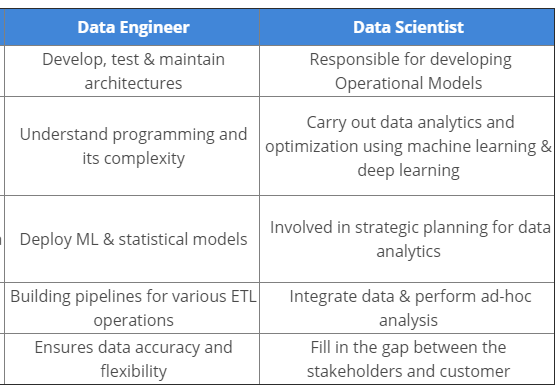
What does a Data Scientist do?
A data scientist usually deals with data that has been previously manipulated and processed. The data is then used by the data scientists for predictive and prescriptive modeling to answer business needs. They work more on the data analysis part of the business. Conducting research, examining data to find & explore hidden patterns and later present the analytical data to various stakeholders is a part of their daily work.
Data analytics and optimization are carried out through machine learning and deep learning. But it doesn’t make the work any easier; a large volume of data from internal as well as external sources is to be analyzed to be presented in the form of a story that contains accurate and well-researched data. First, they interact with business leaders, understand their requirements and convey complex findings with the data to them.
Recommended Readings: Build SaaS Product with a team of Remote Workers
Data scientists need to interact with the business side with their data, they use their programming skills to accomplish what they couldn’t otherwise. They create reports, fulfill queries, identify trends and then generate insights that have the ability to verbally and visually communicate the observations and results to the business so that they can understand it and act on them in the future. The scientists do not build or maintain data infrastructure anymore after the specific bifurcation of the job profiles of data engineers and data scientists.
Expertise of Data Engineers
A data engineer is a qualified engineer in the computer science field and is skilled in Mathematics, Programming & Big Data. Comprehensive knowledge of how big data operation works, the strengths and weaknesses of all the tools used is mandatory. Here are the basic requirements of a data engineer’s job profile:-
- Practical knowledge of Linux
- Experience with Python or Scala/Java
- SQL
- Deep understanding of frameworks (Spark, Flink, etc.)
- Working Knowledge of MongoDB, PostgreSQL, and Redis
- Experience with cloud-based data solutions including AWS, EC2, EMR, etc.
- Internal and external root cause analysis
- Development, Management, and optimization of big data architectures and pipelines
Other than that, the programs majorly used by a Data Engineer include Hadoop, NoSQL, and Python. The engineers need to take unrefined data sources and convert them into clean and reliable data sets so that data scientists can run queries against the same.
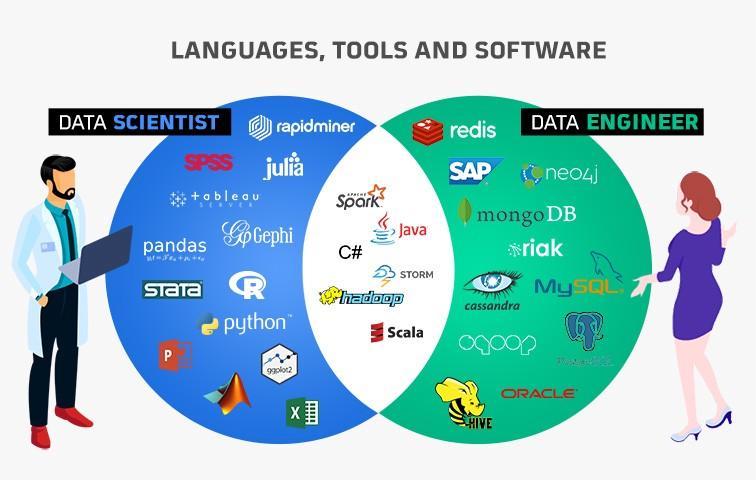
Expertise of Data Scientist
In general, the data scientist has a Mathematics, Statistics or Physics background. To get into the detailed expertise required for a data scientist to be able to perform the required job,
- he/ she must possess statistical and analytical skills
- should be well-versed with Machine Learning and Deep Learning principles (artificial neural networks, clustering, etc.)
- data optimization and decision making skills
- High-proficiency in SQL
- Experience with Java and Python for Data Science
- Knowledge of predictive modeling algorithms and frameworks
- Expertise in Hadoop
- Experience in analyzing data from various platforms including AdWords, Google Analytics, Facebook Insights, etc.
- NoSQL and relational Databases’ knowledge
- Communication skills to convey technical findings to non-technical business members
The data scientist uses these skills in order to make business decisions based on the data, the findings need to be accurate.
In the case of data engineers, they may or may not be Machine Learning or Deep Learning experts.
Payscale of Data Engineers
According to Glassdoor, on an average, data engineers’ salaries range from $43K to a maximum average of $364K depending upon the level of experience and expertise.
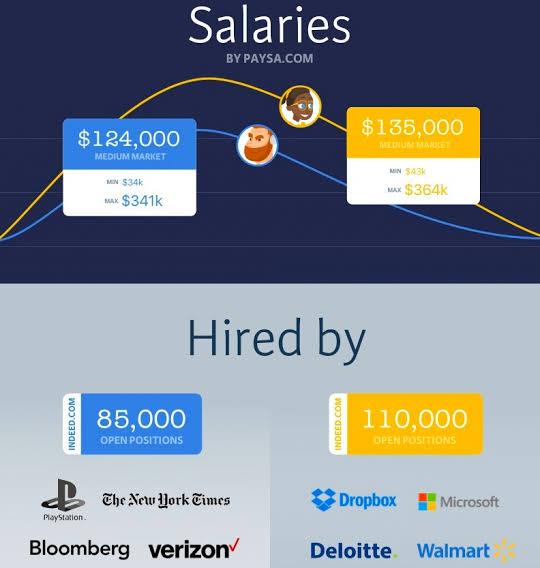
Payscale of Data Scientists
The average pay scale of data scientists varies from $34K to $341K. It depends upon the kind of business, data science projects, experience as well as expertise in the field of data science.
Overlapping Skills
Clearly, both data scientists and data engineers need to work together as a team in order to produce good results but they shouldn’t be expected to perform all the tasks related to data science (from creating pipelines, performing analysis to communicating to business owners).
However, they possess a few overlapping skills but the level of expertise in skills is completely different.
- Analytics
Both the data scientists and data engineers possess analytical skills. They know how to analyse data in order to give results and suggestions to a business but when you compare the level of expertise, the data scientist has a deeper and more advanced knowledge of analytics. If a data engineer is asked to perform analysis, he/she will only be able to perform it at an amateur or intermediate level. As mentioned previously, the data scientist knows how to take data from internal and external sources and is well-versed with various tools including Google AdWords, Google Analytics, etc. - Programming
Yes, it’s true that data engineers and data scientists are skilled in programming but data engineers know way more than data scientists. Creating data pipelines may sound like an easy task but it is only a skilled data engineer that can create it in an effective and understandable way. Once the data pipelines are created, the data scientist’s role comes into play. - Big Data
Having read the above content, you might have understood how different the two job profiles are in terms of skills and their expertise level. Another overlapping skill of a data scientist and data engineer is that of Big Data. Employers may often think that a data scientist will be able to create Big Data pipelines but they’re mistaken! It is the data engineer’s job of creation of the pipelines that are then used by the data scientists. The data scientists use their advanced math skills to perform data science analysis.
How to hire the right person?
Data is incredibly complex in nature and to hire the right person for the current requirement in your organization is of utmost importance. If your business is in its early stages, hiring a data engineer will be more beneficial as he/she will construct systems that can be analyzed by data scientists. On the other hand, if you are farther along in the business, you will need a data scientist who will use the data systems to further provide insights for improvements in the performance of your business.

The output that you get from a data scientist would be an insightful data product while the output from a data engineer would be a data flow, storage and retrieval system.
Job Outlook
Working with Big Data provides a huge number of opportunities to learn, grow and earn as a data science professional. Without data engineers, the data would be unusable and very difficult to analyze for further advancements. Currently, the number of jobs for data engineers have increased remarkably as compared to a few years ago. As per Glassdoor, the number of job openings of data engineers is approximately five times more than those of data scientists.
A data science team involves the work and efforts of both – data engineers and data scientists. As the demand for data management has significantly raised, big companies like PlayStation, The New York Times, Bloomberg, Amazon and many more are seeking for data science professionals and enthusiasts who will manage data efficiently to provide good results.
Organizations fail to understand the difference between the two job roles, however, they should be hiring employees with unique skills by distinguishing them. A data scientist will relatively be an amateur in data pipeline creation and may make the wrong choices. He/she can acquire the skills of a Data Engineer but a company could easily hire a data engineer and get a better ROI (return on investment) in terms of time and money.
In conclusion, we hope that the differences drawn in the blog gave you a clear understanding of the exact difference between a Data Scientist and a Data Engineer. A collective comprehension of the subject will make it easier for you or your business to manage data in a better and in a more effective way.
We at EngineerBabu have worked for over 5000 business owners and founders that share a common goal of incredible business performance while also sharing a common struggle: the inability to find adequate engineering talent to scale their businesses.
We work with the mission to push the world forward by bringing global opportunities to talent and bringing great talent to tech companies with remote teams of skilled engineers all around the world.
Recommended Readings: Top 10 Tech Companies who allow to Work Remotely
If you’re looking to hire a team of talented engineers that will go far and beyond to serve your requirements without having to face the hassle of recruitments, you’ve come to the right place. EngineerBabu gives you the opportunity to diversify your sourcing strategy; we provide your business with quick and impressive access to worldwide talent pools.
We constantly engage with high-caliber talent that is beyond average and once a client is on-board with us, we kick off the first candidate in just 5 days. Other than that, our workspaces are high-quality and fully equipped to suffice everything you need to be productive and deliver a high-quality product. Above all, we do all this taking 50% less time compared to other recruitment companies.
We hope that this blog addresses the queries about the difference between a data scientist and a data engineer. Let us know in the comments below if you would like to read more such blogs. Also, if you liked this blog, feel free to share it with your friends, family or acquaintances.
To read more related blogs or know about our services or previous work, you can visit our website.
Feel free to or Contact us anytime.
Handpicked Blogs for You:

